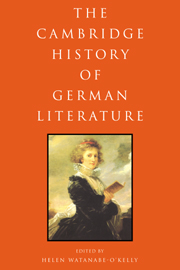Book contents
- Frontmatter
- 1 The Carolingian period and the early Middle Ages (750–1100)
- 2 The high and later Middle Ages (1100–1450)
- 3 The early modern period (1450–1720)
- 4 The German Enlightenment (1720–1790)
- 5 Aesthetic humanism (1790–1830)
- 6 Revolution, resignation, realism (1830–1890)
- 7 From Naturalism to National Socialism (1890–1945)
- 8 The literature of the German Democratic Republic (1945–1990)
- 9 German writing in the West (1945–1990)
- Select bibliography
- Index
- References
8 - The literature of the German Democratic Republic (1945–1990)
Published online by Cambridge University Press: 28 March 2008
- Frontmatter
- 1 The Carolingian period and the early Middle Ages (750–1100)
- 2 The high and later Middle Ages (1100–1450)
- 3 The early modern period (1450–1720)
- 4 The German Enlightenment (1720–1790)
- 5 Aesthetic humanism (1790–1830)
- 6 Revolution, resignation, realism (1830–1890)
- 7 From Naturalism to National Socialism (1890–1945)
- 8 The literature of the German Democratic Republic (1945–1990)
- 9 German writing in the West (1945–1990)
- Select bibliography
- Index
- References
Summary
The return of the exiles (1945–1949)
East German literature was born out of the grief and desperate hopes of a generation of writers for whom modernism and politics were intertwined. Some of them – Anna Seghers, Bertolt Brecht, Arnold Zweig, Friedrich Wolf, Johannes R. Becher – were children of the Wilhelmine bourgeoisie who had become internationally renowned during the Weimar Republic. Others – Eduard Claudius, Hans Marchwitza, Willi Bredel, Adam Scharrer – had come from the working class and began writing about production within the worker correspondent movements of the twenties. Still others – the poets Erich Arendt, Stephan Hermlin, Peter Huchel; the novelists Erwin Strittmatter and Stefan Heym; the playwright Alfred Matusche – first established themselves after World War II. They all devoted themselves after Hitler’s downfall to the creation of a humanistic, anti-fascist literature which would prevail in the German Democratic Republic for forty years from its official foundation in 1949.
History was not to be on their side. Their childhood years had coincided with the height of German military expansionism. With the suffering and chaos caused by World War I, which these writers experienced as young adults, many of them as soldiers, they willingly surrendered their nationalistic inheritance and became cosmopolitans. In the aftermath of the revolutions in Russia, as well as the failed German revolutions in which a number of them participated, they became committed socialists and communists. They identified with the European avant-garde movements of the time and participated in some of the most fascinating artistic and intellectual projects of the 1920s. In 1933 most of these writers were blacklisted by the National Socialists.
- Type
- Chapter
- Information
- The Cambridge History of German Literature , pp. 393 - 439Publisher: Cambridge University PressPrint publication year: 1997
References
- 2
- Cited by

